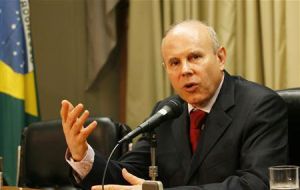MercoPress. South Atlantic News Agency
Don’t wait for the end of the EU crisis: boost trade among emerging economies, recommends Brazil
 Mantega forecasts the EU situation will drag for another three/four years because lack of leadership
Mantega forecasts the EU situation will drag for another three/four years because lack of leadership Brazilian finance minister Guido Mantega said that resolving Europe’s economic problems are likely to drag out over coming years due to a complex and slow process of decision-making in the region and recommended emerging economies to promote domestic consumption and trade among them.
“There is not solution to the EU crisis in the short term”, said Mantega following a meeting in Paris with his peer Pierre Moscovici and top executives from French companies interested in investing in Brazil.
Mantega who on Thursday will be in London said that the measures agreed in the EU “remain on paper” because of clashing interests of the leading countries of the Euro zone which “delays everything to eternity”.
France supports and is interested in the implementation of those measures, “particularly a greater involvement of the Euro Central bank in buying debt from countries in difficulties, but we all know, I won’t give names, some countries have political problems and continue delaying putting them into action”.
“And there will be no solution to the European crisis as long as these urgent problems are not solved in the short term. As long as countries and banks are at risk, economies will continue to be imperilled”, forecasted the Brazilian minister.
This means that emerging countries have to organize to address the situation since they can’t count with the recovery of the European market “since it will remain stagnant for three, four years”.
Mantega said that those countries with a model based on exports such as China, which depend more on foreign than domestic markets, will have to find a substitute for the EU market. This means emerging countries and promoting domestic demand.
The minister added that creating jobs is one of the main challenges for the US and the EU, contrary to Brazil which has “solid foundations” although admitting that the quality of labour, as was pointed out to him by French business people, “is an obstacle for the development of the country”.
But on the bright side Mantega mentioned Brazil’s budget deficit below 2% of GDP; ample margin to reduce costs plus tax breaks and different direct stimuli as the infrastructure and public works program, plus a domestic market which does not cease to expand and with direct impact on jobs.
Mantega revealed that in the next few years Brazil expects anywhere from 30 to 40 million Brazilians to climb out of poverty, which will help make the country, with a population of 190 million, the world’s fifth largest market.
Finally tuning down his strong criticism of the US Federal Reserve latest stimuli measures, Mantega said that monetary decisions are not enough: the US needs fiscal measures, since otherwise “the devaluation of the dollar ends hurting the currencies of emerging countries”.
“Monetary stimuli instead of going to production end in the financial sector, particularly Wall Street and the emerging countries, which in turn can’t prevent revaluation of their currencies which erodes competitiveness”.
Mantega said whoever wins the US presidential election in November “will have to apply fiscal policies to make the economy grow, plus cleaning up the housing market and stimulating consumption. The monetary strategy applied so far is rapidly losing efficacy”.




Top Comments
Disclaimer & comment rules-

-

-

Read all commentsHis advise are the wisest words I heard in the past 10 years.
Sep 19th, 2012 - 10:20 pm 0More common sense rather than wise, why wait for a lagging economy if yours is thriving.
Sep 20th, 2012 - 09:52 am 0Can`t argue with common sense.
Sep 20th, 2012 - 10:30 am 0Commenting for this story is now closed.
If you have a Facebook account, become a fan and comment on our Facebook Page!